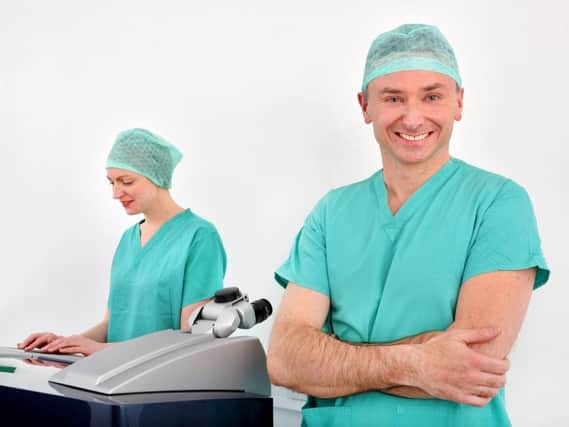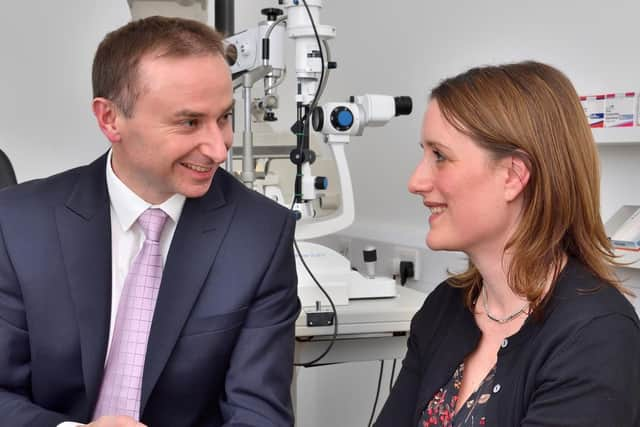Cataract crisis: Jonathan Ross urges people in Edinburgh and Glasgow to seek help


Improved life expectancy and medical advances means an increasing number of Scots will hit their golden years with cataracts, which will affect their vision – in some instances, severely impairing sight.
It is likely to send demand for cataract removal surgery – the only way to treat cataracts – spiralling, placing increasing pressure on the NHS with longer waiting times to be treated.
Now a leading expert in cataract surgery, Mr Jonathan Ross, of eye surgery specialists Laser Vision Scotland, is urging Scots to take extra steps to tackle the threat of cataracts before it’s too late.


He said: “Cataracts are very common in older age groups. By the time they reach 80, more than half of people are affected.
“Unfortunately, a trip to the optician might not always pick up on cataracts being present, and they might just end up getting stronger glasses at each visit.
“But if cataracts are caught early and you act before it is ‘ripe’, the outcome can be much better.”
Cataracts, which are a part of the body’s natural aging process, cause the eye’s lens to cloud over and vision to go ‘misty’, colours might become washed out and sufferers become more sensitive to bright lights.
One or both eyes can be affected, and certain factors can add to the risk of developing cataracts. They include diabetes, eye trauma, certain medications, previous retinal surgery and a range of eye conditions such as retinitis pigmentosa, glaucoma or uveitis. Being very short sighted can also raise the risk.
There are two types of cataract: nuclear sclerosis cataracts which turn the lens yellow and affect colour vision, and cortical cataracts which lead to white streaks just under the surface of the lens. These affect the vision, giving rise to glare and dazzle, particularly at night time and when driving.
Currently one in three of over-65s have some degree of sight impairment as the result of cataract formation, and the statistics are even more startling among British people of Indian origin – more than 80 per cent over the age of 45 already have cataracts to some extent.
Because cataracts form slowly many of us are unaware that they are even there until some of the damage is done.
Mr Ross added that early cataracts can sometimes be tricky even for opticians to spot, while their development can be easily mistaken for just normal effects of vision deterioration linked to getting older.
“People start off thinking their vision is not quite right and they might need their glasses updated. But cataracts might not be picked up, and they keep getting new glasses with no improvement in their vision.
“It’s important to have regular eye tests to check for signs of cataracts.”
Specialists Laser Vision Scotland can offer a range of private treatments – some which can little more than 20 minutes – which can stop the damage by removing the cataract and replacing the lens with an implant.
The clinic also carries out specialist cataract surgery which is not available through the NHS.
That includes multifocal cataract surgery which, as well as tackling cataracts can help improve general vision and ease reliance on glasses, and toric lens implants which suit patients who have significant amounts of astigmatism which causes blurred vision when looking at distant objects.
Modern cataract surgery is an extremely safe procedure with a success rate of more than 99 per cent. Treatment can be completed in under half and hour and require just a half-day visit to the clinic.
Mr Ross, who is a specialist in refractive cataract surgery and laser eye surgery and performs upwards of 2000 eye surgeries at Laser Vision Scotland clinics every year, added: “The next three decades will see a sharp rise in the number of people living longer and needing extra healthcare – and that will include a rise in demand for cataract surgery.
“It is important to recognise that cataracts are easier, quicker and safer for a surgeon to remove if they are treated at an earlier stage rather than waiting until they are advanced.”
Laser Vision Scotland has clinics in Edinburgh and Glasgow, both of which offer a wide range of treatments to help rectify various eye problems, including laser eye surgery for vision correction, implantable lens surgery to help patients who are short or long-sighted, as well as treatment for macular degeneration and other less common conditions.
Find out more about the range of eye treatments, including cataract surgery, that’s available at Laser Vision Scotland here.
Laser vision Scotland is holding a free cataract treatment patient information event on November 3. Register now at https://www.laservisionscotland.co.uk/free-information-event-2